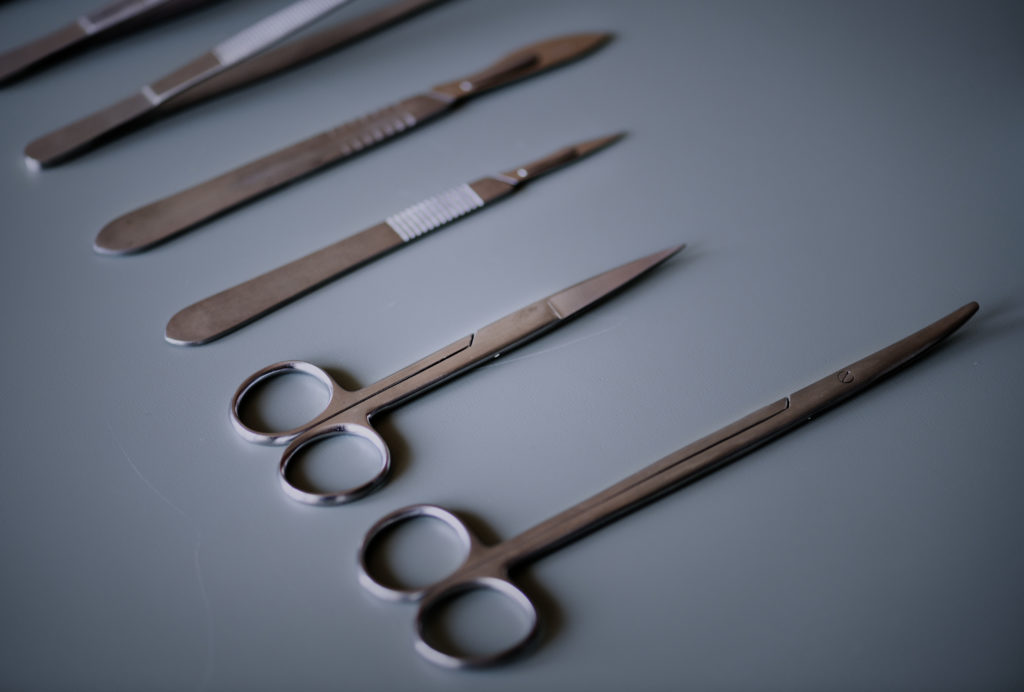When starting a practice, it is difficult to think of everything you may need. You will probably find yourself forgetting a few rare items and will not realize that you need them until it is time to use them. To save money, you may need to be flexible or resourceful and cost shop a little bit. Remember that you completed a very competitive residency and that you can probably improvise if you forget something on the first round of purchases.
One major consideration is to look at supply options besides what you are accustomed to using. For example, those blue Personna Dermablade Shave Biopsy Blades you used in residency cost $2 each whereas double edge razor blades that you can break into two shave blades cost $0.02 each. You can also save on biopsy suture that has a shorter thread and may not be the top-of-the-line needle (LOOK brand is pretty good) or opt to use gel foam for punch biopsies. An easy way to assess options is to call a mentor who started a practice or ask your sales rep what other practices regularly purchase. Common electric medical chairs cost around $10,000 but you may find massage chairs or non-electric that suit your needs at a better cost – and many of these are more aesthetically pleasing.
You may consider limiting inventory at first. For example, do you really need every size of curette or will a 4mm and 2mm do just fine? Can you use a limited number of suture and needle sizes? Do you need a mayo stand and hyfrecator for every room or can you have a few to wheel where you need them? A great cost saving technique is that with some savvy mathematical equations and bacteriostatic saline, you can turn Kenalog 40 into any strength you need, thus not carrying multiple inventories. (Plus K40 is cheaper than K10 if you split it that way.)
Another way to save is to buy in bulk. A large aluminum chloride is less expensive than multiple small bottles and can be separated into sterilized glass bottles. A bottle of rubbing alcohol with a spray top is far less expensive, less time consuming and more environmentally friendly than little packs you have to tear open.
As far as cosmetic injectables, consider using only one company’s products. The more you purchase, the more you save so if you have too much variety, your cost of injectables will remain high.
If you decide to incorporate lasers from the start, consider laser devices with mass appeal, a long technological life and no consumable components. Two great lasers to start with are Syneron-Candela’s GentleMax and Cutera’s Excel V. The GentleMax has two wavelengths that serve all skin tones safely and no consumables. The technology remains the gold standard of therapy after almost 20 years. Everyone has hair that they want to get rid of. The Excel V can treat telangiectasia, angiomas, spider veins, bruising, scars and more. It also has no consumables and low maintenance.
Last, consider where you can get things paid for. If you plan to send bacterial cultures and fungal cultures, you will often get lots of sterile urine cups for free. Formalin cups will come from the pathology service you use. Don’t forget to ask for Michel’s media because you will not have it when you need it. Same for viral cultures. Samples from the makers of CeraVe ointment, Cetaphil Ointment or Aquaphor can serve as ointment for biopsies.
There will be a few items you want to spend extra on. I personally find the BD brand insulin syringes to have sharper needles and a smoother push mechanism than the competitor brands. Same with punch biopsy tools as some are sharper and better than others.
The basic supplies necessary for a young dermatologist to get started in a general medical and cosmetic practice are listed below broken into the following categories: large supplies initial startup, small supplies initial startup, basic surgical instruments and miscellaneous.
Large supplies initial startup:
Exam chairs
Hyfercator and stand
Cryo gun
Cryo storage
Protective eyewear and gloves for handling liquid nitrogen
Mayo trays and stand
Electronics
EMR
Printers
Phones
Fax machine
Microscope
Dermatoscope
Autoclave
Storage shelving
Refrigerator
Storage/dispensers for gauze, rubbing alcohol, drawer organizers
Paper towel dispensers / washable hand cloths
Stools
Desk chairs
Metal sterilizer trays
Small supplies initial startup:
Pens
Permanent markers
Highlighters
Clipboards
Needles: 30 ½, nokor, others for variable things
Double edge shave blades
Koh, glass slides, slide cover
Aluminum chloride
Rubbing alcohol
Chlorhexidine or other preferred sterile prep
Post-biopsy ointment
Hydrogen peroxide
Tape
Bandaids: spot and standard most common.
Gauze: soft vs woven, 2in vs 4 in.
Surgical markers
Surgical needles and thread
Drapes
Gloves non-sterile and sterile
Local anesthesia
Sodium bicarbonate
Normal saline (bacteriostatic)
Lancets
Surgical blades #10, 11, 15
Syringes luer lock: 1cc and 3cc
0.3cc insulin syringes
electrode/hyfrecator tips
Hyfrecator sheaths
Liquid adhesive
Cotton applicator swabs
Tongue depressors
Steri strips
Suture
Instrument enzymatic cleaners
Sterilization pouches – self-sealing
Dental bibs or tray prep
Table paper
Pregnancy tests
Punch biopsy tools
Curettes (disposable vs. sterilizable)
Acetone
Kenalog 40
Betamethasone
Toothpicks
Trichloroacetic acid 25%
Liquid adhesive (Mastisol)
Gel foam
Wrapping tourniquet (Coban)
Non-stick gauze
Basic surgical instruments:
Comedone extractors
Scissors: fine tip, curved tip, heavy duty
Forceps: surgical and hemostatic
Skin hooks / Tissue retractors
Scalpel handles
Curettes (vs. disposable)
Extras / Miscellaneous:
Eyeliner pencils
Hyaluronidase
Cannulas
Luer lock connectors
Blood draw supplies
Ultrasound gel and dispenser bottles
Other needles: 25g1, 25g1.5, nokor subcision, 27g1.5, 18g
Cover patient with washable or disposable robes
washer/dryer
Camera or photo setup
Laser safety goggles, eye shields, stickers
Cap remover for neurotoxin bottle
In room music
TV’s
Kenalog 10
Razors if laser hair removal device
Hair clips for surgery or hair loss photos
Vibration device for injectables
Cold spray anesthesia
Sterile water
Irrigation solution
Blood draw tubes
Blood draw vacutainer
Blood draw needles
Bacitracin
Stretchable tape
BY Kate Zibilich Holcomb MD, FAAD & Corey L. Hartman, MD

